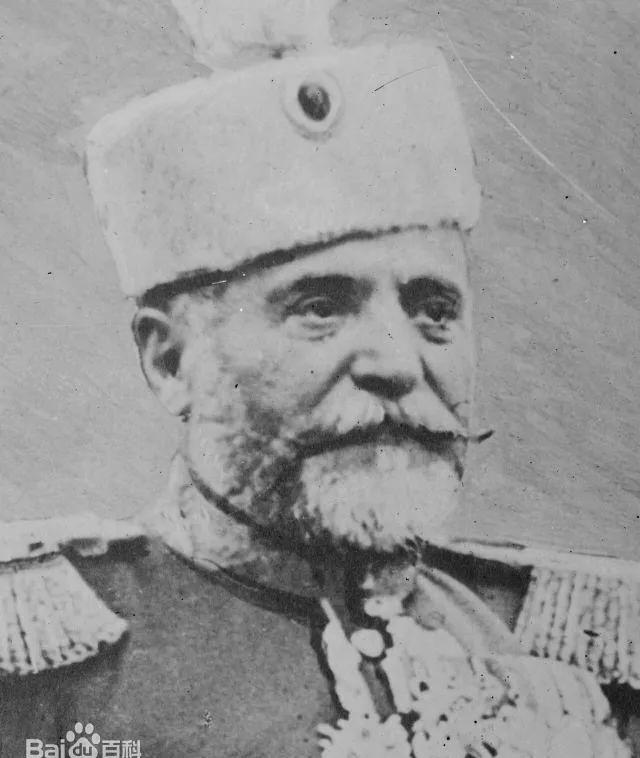The Eighteenth Of the Allied Generals of the First World War Series
Radomil Putnik (24 January 1847 – 17 May 1917) was a Serbian field marshal and chief of the Serbian General Staff during the Balkan Wars and World War I. One of the greatest soldiers produced in world war I.

Born as an artilleryman, he served three times as Secretary of State for War
Born in Kragujevac, the son of a secondary school teacher, educated at the Serbian Artillery Academy, he was appointed second lieutenant in 1866 and fought in the War against Turkey in 1876, and although Serbia lost the Battle of Alexi in September and the Junis region in October, he was notorious for his outstanding performance. After the outbreak of the Tenth Russo-Turkish War in 1877-1878, he participated in the counter-offensive with the Russian army.
In 1885 he took part in the unfortunate war against Bulgaria as chief of staff of the division, where he suffered a heavy blow at the Battles of Slivnitsa and Pietro in November. He graduated from the Army Staff College in 1889. Steadily promoted to general, he became chief of staff in 1903 and secretary of state of the army three times (1904-1905; 1906-1908; 1912). In order to save Serbia from the trauma of its early years, he worked to improve the vocational skills of the Serbian army and improve its armament and training. Under his leadership, the Serbian army became a well-equipped, technologically advanced and highly morale-hardened force.
When the First Balkan War broke out in October 1912, he served as commander-in-chief, which was instrumental in the Serbian army's victory at the Battle of Kumanovo on 24 October, using tactical deception to induce the Turks to abandon tactical points at the Papuna Passage, and then on November 5, Mortiser defeated the Turkish army, forcing Turkey to abandon almost all of Macedonia. In the Second Balkan War, his command skills were an important factor in the victory of the Serbian army in the attack on the Bulgarian Third and Fourth Armies stationed in the Breganitsa region.
Returned to the war and defeated the Austrians
Before the outbreak of the First World War, during the mobilization of the Austro-Hungarian War, The Serbian Field Marshal Putnik was on vacation in the Austrian province of Bohemia, and the Austro-Hungarian Emperor Joseph did not detain him, but arranged a train to take the old marshal back to Belgrade. His poor physical condition limited him to staying on a train and directing the Serbian army on a map, facing the well-equipped and numerous Austrian army commanded by Oscar Poolek, who on August 16 launched a fierce counterattack on the Yalda River, driving the Austrians back to the other side of the Drina River within a week (16-21 August).
Austro-Hungarian army
On 6 September he launched a limited offensive into Austria-held Bosnia with the intention of cutting off the supply lines of the Austrian 6th Army, but a new Austrian offensive across the Drina River forced him to withdraw to camp southwest of Belgrade, and under the third offensive launched by the Austrian army in November, he simply abandoned the capital Belgrade and withdrew his troops to the southwestern mountains, lengthening the Austrian supply lines. Taking advantage of the flooding of the Koluba River in the rear of the Austrian army, he reacted with a fierce counterattack, once again crushing the superior Austrian army and retaking Belgrade.
The Germans counterattacked, unable to resist
The front line was quiet for 10 months, the Resources and Supplies of the Serbian Army were increasingly scarce, unable to resist the three-sided attack of the German 11th Army, Bulgaria and Austria-Hungary, and in October 1915, the Serbian army was driven into the hinterland. By the end of November, they had crossed distant mountains and retreated. Putnik traveled by car across the mountains to the Albanian sanatorium, where the remnants were taken in and rearmed by the British Navy and evacuated to Corfu. As a result, he was dismissed from his post in early 1916 and went to Nice to recuperate, where he died on 17 May 1917.
Putnik was a well-known commander, resourceful, determined and strategic, who was particularly adept at using terrain for the best possible combat results, both offensively and defensively, and in his later campaigns, unable to survey the terrain himself, he could only use maps, and Serbia believed that its victory in 1914 was due to the astonishing bravery and tenacity of its generals and troops.